Supplemental Digital Content is available in the text
Keywords: Mediterranean dietary pattern, meta-analysis, prostate cancer, risk
Abstract
Background:
Mediterranean dietary pattern has attracted great attention in terms of its effect on human health. However, whether Mediterranean dietary pattern is an independent protective factor for prostate cancer remains controversial. Our goal was to evaluate this association by conducting a meta-analysis of observational studies.
Methods:
We searched the PubMed and EMBASE database through February 2019 for relevant studies that examined the association between Mediterranean Diet and prostate cancer risk. The combined risk estimates were computed using a DerSimonian random-effects model.
Results:
A total of 10 eligible studies were included in this meta-analysis. The pooled risk estimates and 95% confidence interval (CI) in relation to Mediterranean diet pattern were 0.95 (95% CI: 0.90 to 1.01) for total prostate cancer, 0.93 (95% CI: 0.75 to 1.14) for advanced prostate cancer, 0.96 (95% CI: 0.81 to 1.14) for localized prostate cancer, and 0.92 (95% CI: 0.76 to 1.11) for fatal prostate cancer. There was no evidence of heterogeneity for total (P = .326, I2 = 12.7%), localized (P = .706, I2 = 0.0%) and fatal prostate cancer (P = .282, I2 = 13.0%), but not for advanced prostate cancer (P = .018, I2 = 63.4%).
Conclusion:
This large meta-analysis of observational studies suggests that Mediterranean dietary pattern has no relationship with prostate cancer risk.
1. Introduction
Prostate cancer is the second most common cancer in men worldwide with approximately 220,000 newly diagnosed cases and 27,500 patient deaths annually in the United States.[1] In China, there were about 60,300 newly diagnosed cases and 26,600 patient deaths from prostate cancer in 2015.[2] Although localized prostate cancer has a favorable prognosis, the 5-year survival rate drops to less than 30% for patients with advanced metastatic tumors.[3] Age, race, and family history of prostate cancer are the only well-established risk factors for prostate cancer.[4] Therefore, it is urgent to further reveal other risk and protective factors to improve the prevention of prostate cancer.
Mediterranean dietary pattern has attracted great attention in terms of its effect on human health. Mediterranean diet encourage consumption of vegetables and fruits, nuts and seeds, whole grains, dairy products, olive oil, fish, and fresh seafood, while restricted intake of red meat and processed, fatty and sugary foods.[5,6] Jones et al[7] reported that a high adherence to the Mediterranean dietary pattern is significantly associated with a lower risk of colorectal cancer, especially rectal cancer in UK Women's Cohort Study. Witlox et al[8] found an inverse association between the Mediterranean diet and bladder cancer risk based on a pooled analysis of 13 cohort studies. Hodge et al[9] suggested that adherence to Mediterranean dietary pattern was significantly inversely associated with lung cancer risk in the Melbourne Collaborative Cohort Study. It also has been hypothesized that Mediterranean dietary pattern may reduce the risk of future prostate cancer events. In the past few years, there is a rapidly growing interest in testing this hypothesis. Many epidemiologic studies have examined the association between Mediterranean diet and the risk of prostate cancer, and most found a negative but not significant association possibly due to the limited power in individual studies.[10–14]
A better understanding of this issue may have potential important public health and clinical implications as widely recommendation of Mediterranean dietary pattern possibly reduce the incidence of prostate cancer. Therefore, the aim of our study was to evaluate the association between Mediterranean diet and the risk of total prostate cancer, advanced prostate cancer, localized prostate cancer, and fatal prostate cancer by performing a meta-analysis of observational studies.
2. Methods
2.1. Search strategy
We reported this meta-analysis according to the PRISMA guidelines.[15] We searched the PubMed and EMBASE database through February 2019 for relevant studies that examined the association between Mediterranean dietary pattern and prostate cancer risk. The following search terms were used:
-
1.
Mediterranean diet, Mediterranean, MD score, dietary pattern, Mediterranean diet score, dietary score, and dietary adherence; and
-
2.
prostate cancer and prostate neoplasm. No restrictions on publication date or language were imposed.
In addition, we checked the reference lists of retrieved articles and reviews for additional potentially relevant studies. This is a systematic review and meta-analysis, which was based on previous published studies and did not have original data. Therefore, no ethical approval and patient consent are required.
2.2. Study selection
We firstly performed an initial screening of titles and/or abstracts to exclude obviously irrelevant studies. Then a second screening of full-text article was performed. Included studies met the following criteria:
-
1.
It was an observational study, including cohort, nested case-control, case-cohort, or case-control study;
-
2.
the exposure of interest was Mediterranean dietary pattern;
-
3.
the outcome of interest was prostate cancer risk; and
-
4.
risk estimates and the corresponding 95% confidence interval (CI) (or data to calculate them) were available.
2.3. Data extraction
Data extraction was performed using a standardized data-collection form with pre-defined variables. We extracted any reported relative risks (RRs), hazard ratios (HRs), odds ratios (ORs), or incidence density ratios of outcomes for participants with highest Mediterranean diet score compared with the lowest group. We also extracted the following study characteristics: first author's surname; publication year; country of origin; study design; study name of source; period of follow-up for cohort studies; age of study population; number of prostate cancer cases and controls/total participants; ascertainments of Mediterranean diet; assessments of outcomes; and statistical adjustments for confounding factors. Two authors (SC and GL) independently performed the studies selection and data extraction. Any disagreements were resolved by consensus.
2.4. Statistical analyses
RR was used as a summary effect size estimate of the association between Mediterranean diet pattern and the risk of prostate cancer across studies. Because prostate cancer was a rare disease, the HRs and ORs were directly considered as RRs. The combined risk estimates were computed using a DerSimonian random-effects model.[16]
Homogeneity of RRs across studies was examined using the Q statistic (significance level at P < .10). The I2 statistic was also calculated to quantitatively measure the inconsistency across studies.[17] Because study design, sample size, and ascertainment of Mediterranean diet pattern were not consistent across studies, we further performed various subgroup analyses to explore possible explanations for heterogeneity. We also examined the influence of a single study on the overall risk estimate by repeating meta-analysis after omitting one study in each turn.
Potential publication bias was firstly assessed by visual inspection of a funnel plot in which the log RR was plotted against its SE. We also performed the Begg rank correlation test[18] and Egger linear regression test[19] to examine the publication bias. The subgroup analysis, sensitivity analysis, and publication analysis were only performed for total prostate cancer risk because of rather small numbers of studies for other outcomes. All analyses were performed using STATA version 11.0 (StataCorp LP, College Station, TX). The P < .05 was considered statistically significant, except where otherwise specified.
3. Results
3.1. Literature search
We initially retrieved 338 unique citations from the PubMed and EMBASE database. Of these, the majority were excluded after the first screening of abstracts and/or titles, mainly because they were reviews, non-human studies, or obviously not relevant to our analysis. After full-text review of 18 articles, 8 studies were excluded because of the following reasons: lack of exposure information (n = 3), lack of outcome information (n = 4), and lack of risk estimates (n = 1). Finally, 10 studies[11–14,20–25] were included in this meta-analysis. A flow chart showing the process of study selection is presented in Figure 1.
Figure 1.
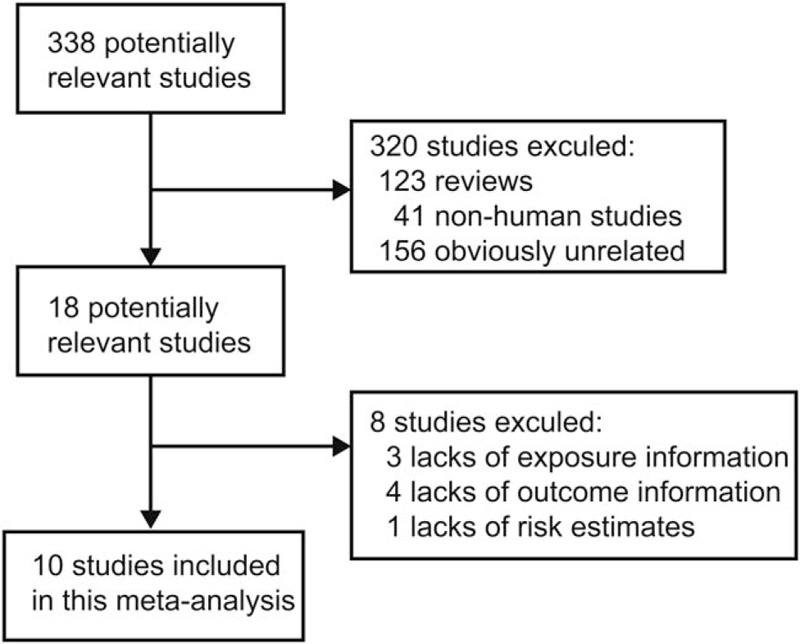
Flow diagram of literature search process.
3.2. Study characteristics
The main characteristics of the 10 observational studies, including 5 cohort and 5 case-control studies, are presented in Table 1. These studies were published between 2009 and 2018. Two studies were performed in the United States, 5 in Europe, 2 in Iran, and 1 in Australia. The number of prostate cancer cases ranged from 52 to 23,453 (total 33,451). The ascertainment of Mediterranean diet pattern varied across studies, with most based on self-report or interviewer-administered questionnaires. All 10 studies reported total prostate cancer risk in relation to Mediterranean diet pattern, 6 reported advanced prostate cancer, 3 reported localized prostate cancer, and 2 reported fatal prostate cancer. Outcome assessments were based on a variety of sources, including medical records, cancer register, and hospital database. NOS score ranged from 6 to 9 with a mean value of 7.4 (Supplementary Table S1).
Table 1.
Main characteristic of included studies.
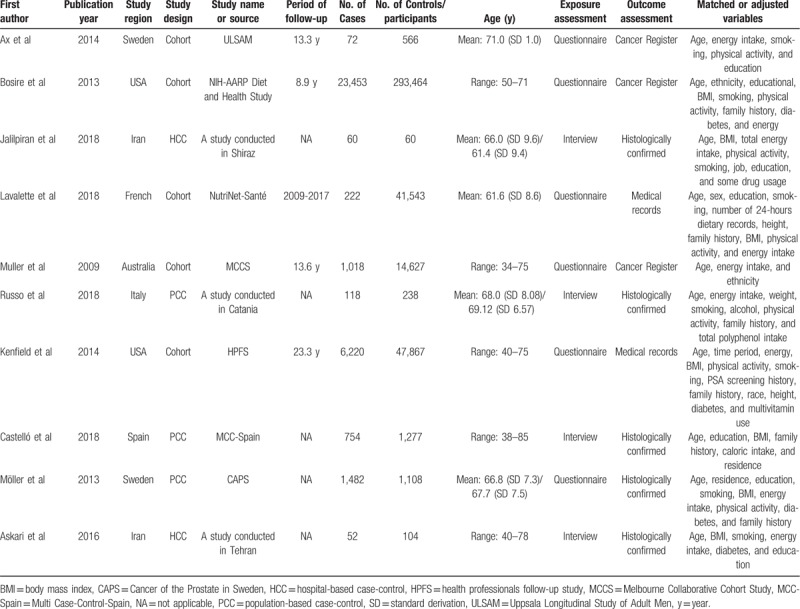
3.3. Mediterranean diet pattern and the risk of total prostate cancer
Figure 2 shows the results from the random-effects model combining the RRs for total prostate cancer. Among the 10 studies, 8 showed a negative relation between Mediterranean diet pattern and the risk of total prostate cancer but only 2 have a statistically significant effect. The RRs for the association varied from 0.28 to 1.04 across studies. Overall, there was no significant association between Mediterranean diet pattern and the risk of total prostate cancer (RR: 0.95 [95% CI: 0.90 to 1.01]). No obvious heterogeneity was observed (P = .326, I2 = 12.7%).
Figure 2.
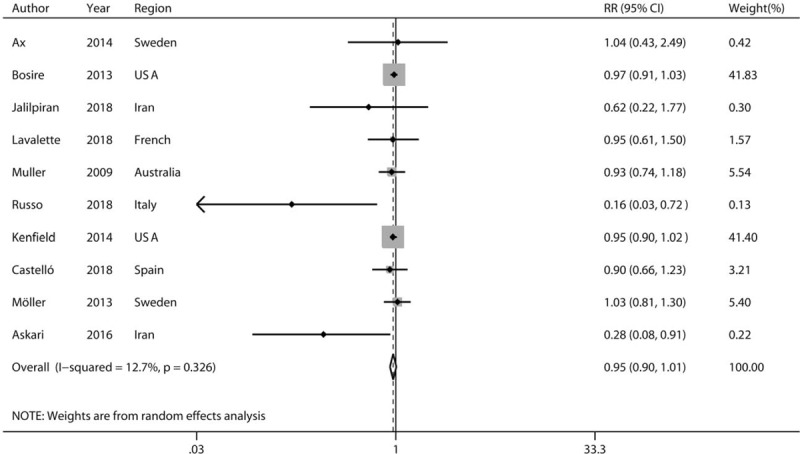
A forest plot of relative risk for total prostate cancer in relation to Mediterranean dietary pattern.
3.4. Mediterranean diet pattern and the risk of advanced, localized, and fatal prostate cancer
Although there were fewer studies for these outcomes than total prostate cancer, the results were relatively consistent. The pooled RRs in relation to Mediterranean diet pattern were 0.93 (95% CI: 0.75 to 1.14) for advanced prostate cancer (Fig. 3), 0.96 (95% CI: 0.81 to 1.14) for localized prostate cancer, and 0.92 (95% CI: 0.76 to 1.11) for fatal prostate cancer. There was no evidence of heterogeneity for localized (P = .706, I2 = 0.0%) and fatal prostate cancer (P = .282, I2 = 13.0%), but not for advanced prostate cancer (P = .018, I2 = 63.4%).
Figure 3.
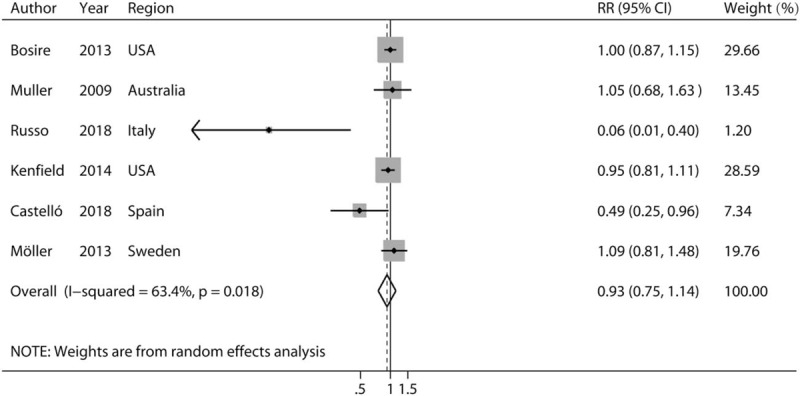
A forest plot of relative risk for advanced prostate cancer in relation to Mediterranean dietary pattern.
3.5. Subgroup analysis and sensitivity analyses
In subgroup analyses, none of the following factors modified the association between Mediterranean diet pattern and the risk of total prostate cancer: geographic area, study design, number of cases, method of exposure assessment, and publication year (Table 2, all P for interaction >.05). Further exclusion of any single study did not materially alter the pooled RR, with a range from 0.93 (95% CI: 0.84 to 1.04) to 0.96 (95% CI: 0.92 to 1.00) (Fig. 4).
Table 2.
Subgroup analysis of the association between Mediterranean dietary pattern and total prostate cancer risk.
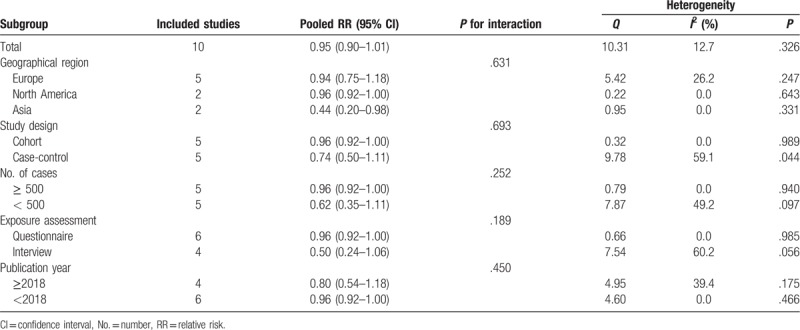
Figure 4.
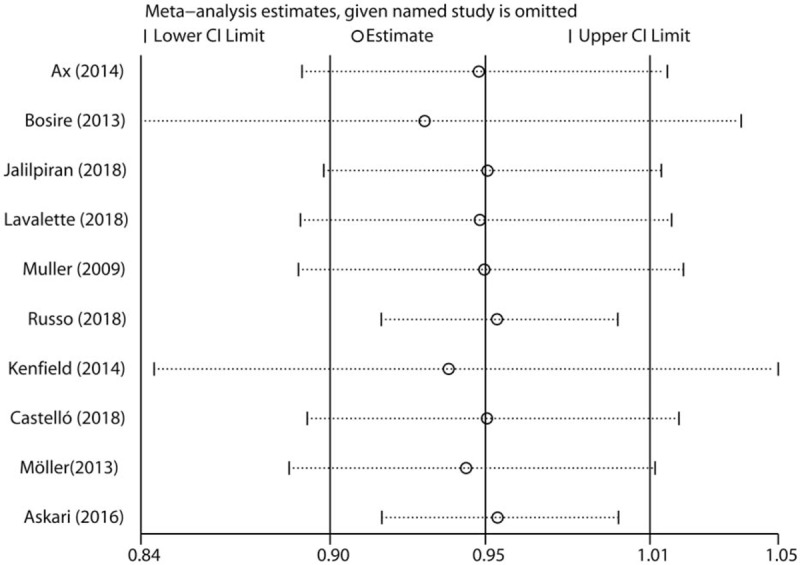
Sensitivity analysis was performed by excluding each study in turn.
3.6. Publication bias
Visual inspection of a funnel plot identified a certain degree of asymmetry (Fig. 5). The Begg rank correlation test also indicated that there was some evidence of publication bias among studies of Mediterranean diet pattern in relation to the risk of total prostate cancer (Begg, P = .049; Egger, P = .770).
Figure 5.
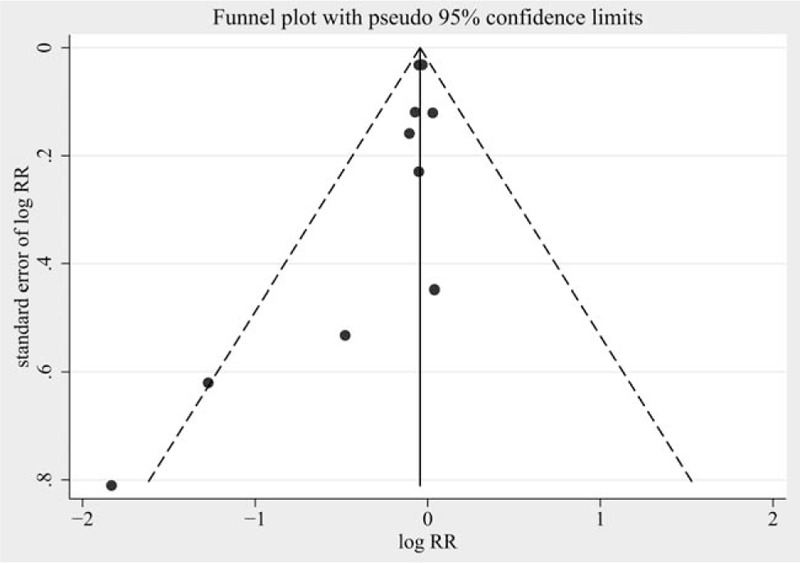
A funnel plot for publication bias.
4. Discussion
There is rapidly growing interest in the association between Mediterranean dietary pattern and health outcome. Our meta-analysis of 10 eligible epidemiological studies provides evidence that Mediterranean Diet is not related with the risk of total, advanced, localized, or fatal prostate cancer.
The results of our study were not completely in agreement with a recent meta-analysis on the same topic. This systematic review published in 2017 by Schwingshackl et al[26] investigated the effects of adherence to Mediterranean Diet on the risk of various types of cancer. They found a borderline statistically significant association of Mediterranean Diet with prostate cancer risk based on 6 studies (RR: 0.96, 95% CI 0.92 to 1.00). By contrast, our meta-analysis included more relevant studies (a total of 10 studies) and thus had larger sample size, which provided a more firm conclusion.
The potential protective effect of Mediterranean dietary pattern on the risk of prostate cancer has some theoretical basis. The main component of the Mediterranean Diet is olive oil, which has protective effects against cancer due to oleic acid, the main MUFA in olive oil.[27] In addition, Mediterranean Diet also has high consumption of tomato sauce. A previous large meta-analysis included a total of 24 published studies with 15,099 cases and indicated that tomato intake was associated with a reduced risk of prostate cancer (RR 0.86, 95% CI 0.75–0.98, P = .019).[28] Therefore, Mediterranean Diet represents a healthy dietary pattern in the context of a healthy lifestyle habits.[29] By contrast, an unhealthy dietary pattern, Western Diet, significantly increased the risk of prostate cancer.[30] However, the results of this large meta-analysis failed to reveal a protective effect of Mediterranean Diet on prostate cancer risk.
Our study had some limitations. First, the inclusion of case-control studies had the possibility of reverse causation and selection bias. Therefore, we have performed subgroup analysis by study design (case-control vs cohort studies) and the results were consistent. Second, some evidence of publication bias was observed using funnel plot and Begg test. Although we comprehensively searched the PubMed and EMBASE database, grey literature, such as conference abstract, dissertations, committee reports, and so on, was less likely to be found.[10] Third, the eligible studies for some outcomes were few and thus additional studies are required to reach a definitive conclusion. Finally, the definition of Mediterranean dietary pattern and cutoff points varied across studies, which possibly introduced some misclassification bias. The bias can either be away from or towards the null hypothesis.[31]
Our study also had some strength. A major strength of our study is that the low heterogeneity across studies. Moreover, sensitivity analyses and subgroup analyses based on various study characteristics do not change the direction of the association between Mediterranean dietary pattern and the risk of total prostate cancer. Finally, using an enlarged sample size of 33,451 cases, we have enhanced statistical power to provide more precise and reliable risk estimates.
5. Conclusion
This large meta-analysis of observational studies suggests that Mediterranean dietary pattern has no relationship with prostate cancer risk.
Author contributions
Conceptualization: Sheng Cheng, Qiming Zheng, Guoqing Ding, Gonghui Li.
Data curation: Sheng Cheng, Qiming Zheng, Guoqing Ding, Gonghui Li.
Formal analysis: Sheng Cheng, Guoqing Ding, Gonghui Li.
Funding acquisition: Sheng Cheng, Guoqing Ding, Gonghui Li.
Investigation: Sheng Cheng, Gonghui Li.
Methodology: Sheng Cheng, Qiming Zheng, Guoqing Ding, Gonghui Li.
Project administration: Sheng Cheng, Gonghui Li.
Resources: Sheng Cheng, Qiming Zheng, Guoqing Ding, Gonghui Li.
Software: Sheng Cheng, Guoqing Ding, Gonghui Li.
Supervision: Sheng Cheng, Qiming Zheng, Guoqing Ding, Gonghui Li.
Validation: Sheng Cheng, Gonghui Li.
Visualization: Sheng Cheng, Qiming Zheng, Gonghui Li.
Writing – original draft: Sheng Cheng, Qiming Zheng, Guoqing Ding, Gonghui Li.
Writing – review & editing: Sheng Cheng, Gonghui Li.
Supplementary Material
Footnotes
Abbreviations: CI = confidence interval, HR = hazard ratio, MD = Mediterranean diet, OR = odds ratio, RR = relative risk.
This study was supported by grants from the Zhejiang Science and Technology Project (2017C33058).
The authors declare that there are no conflicts of interest.
Supplemental Digital Content is available for this article.
References
- [1].Siegel RL, Miller KD, Jemal A. Cancer statistics, 2015. CA Cancer J Clin 2015;65:5–29. [DOI] [PubMed] [Google Scholar]
- [2].Chen W, Zheng R, Baade PD, et al. Cancer statistics in China, 2015. CA Cancer J Clin 2016;66:115–32. [DOI] [PubMed] [Google Scholar]
- [3].Patel SA, Vanharanta S. Epigenetic determinants of metastasis. Mol Oncol 2017;11:79–96. [DOI] [PMC free article] [PubMed] [Google Scholar]
- [4].Putnam SD, Cerhan JR, Parker AS, et al. Lifestyle and anthropometric risk factors for prostate cancer in a cohort of Iowa men. Ann Epidemiol 2000;10:361–9. [DOI] [PubMed] [Google Scholar]
- [5].Bach-Faig A, Berry EM, Lairon D, et al. Mediterranean diet pyramid today. Science and cultural updates. Public Health Nutr 2011;14:2274–84. [DOI] [PubMed] [Google Scholar]
- [6].Naska A, Trichopoulou A. Back to the future: the Mediterranean diet paradigm. Nutr Metab Cardiovasc Dis 2014;24:216–9. [DOI] [PubMed] [Google Scholar]
- [7].Jones P, Cade JE, Evans CEL, et al. The Mediterranean diet and risk of colorectal cancer in the UK Women's Cohort Study. Int J Epidemiol 2017;46:1786–96. [DOI] [PubMed] [Google Scholar]
- [8].Witlox WJA, van Osch FHM, Brinkman M, et al. An inverse association between the Mediterranean diet and bladder cancer risk: a pooled analysis of 13 cohort studies. Eur J Nutr 2019;doi: 10.1007/s00394-019-01907-8. [Epub ahead of print]. [DOI] [PMC free article] [PubMed] [Google Scholar]
- [9].Hodge AM, Bassett JK, Shivappa N, et al. Dietary inflammatory index, Mediterranean diet score, and lung cancer: a prospective study. Cancer Causes Control 2016;27:907–17. [DOI] [PMC free article] [PubMed] [Google Scholar]
- [10].Ahmed I, Sutton AJ, Riley RD. Assessment of publication bias, selection bias, and unavailable data in meta-analyses using individual participant data: a database survey. BMJ 2012;344:d7762. [DOI] [PubMed] [Google Scholar]
- [11].Askari F, Beyzaei B, Tehrani A, et al. Adherence to mediterranean-style dietary pattern and risk of prostate cancer: A case-control study in Iran. Pakistan J Nutr 2016;15:305–11. [Google Scholar]
- [12].Moller E, Galeone C, Andersson TM, et al. Mediterranean Diet Score and prostate cancer risk in a Swedish population-based case-control study. J Nutr Sci 2013;2:e15. [DOI] [PMC free article] [PubMed] [Google Scholar]
- [13].Muller DC, Severi G, Baglietto L, et al. Dietary patterns and prostate cancer risk. Cancer Epidemiol Biomarkers Prev 2009;18:3126–9. [DOI] [PubMed] [Google Scholar]
- [14].Russo GI, Solinas T, Urzi D, et al. Adherence to Mediterranean diet and prostate cancer risk in Sicily: population-based case-control study. Int J Impot Res 2018;doi: 10.1038/s41443-018-0088-5. [Epub ahead of print]. [DOI] [PubMed] [Google Scholar]
- [15].Moher D, Liberati A, Tetzlaff J, et al. Preferred reporting items for systematic reviews and meta-analyses: the PRISMA statement. Ann Intern Med 2009;151:264–9. W64. [DOI] [PubMed] [Google Scholar]
- [16].DerSimonian R, Laird N. Meta-analysis in clinical trials. Control Clin Trials 1986;7:177–88. [DOI] [PubMed] [Google Scholar]
- [17].Higgins JP, Thompson SG. Quantifying heterogeneity in a meta-analysis. Stat Med 2002;21:1539–58. [DOI] [PubMed] [Google Scholar]
- [18].Begg CB, Mazumdar M. Operating characteristics of a rank correlation test for publication bias. Biometrics 1994;50:1088–101. [PubMed] [Google Scholar]
- [19].Egger M, Davey Smith G, Schneider M, et al. Bias in meta-analysis detected by a simple, graphical test. BMJ 1997;315:629–34. [DOI] [PMC free article] [PubMed] [Google Scholar]
- [20].Ax E, Garmo H, Grundmark B, et al. Dietary patterns and prostate cancer risk: report from the population based ULSAM cohort study of Swedish men. Nutr Cancer 2014;66:77–87. [DOI] [PubMed] [Google Scholar]
- [21].Bosire C, Stampfer MJ, Subar AF, et al. Index-based dietary patterns and the risk of prostate cancer in the NIH-AARP diet and health study. Am J Epidemiol 2013;177:504–13. [DOI] [PMC free article] [PubMed] [Google Scholar]
- [22].Castello A, Boldo E, Amiano P, et al. Mediterranean dietary pattern is associated with low risk of aggressive prostate cancer: MCC-Spain Study. J Urol 2018;199:430–7. [DOI] [PubMed] [Google Scholar]
- [23].Jalilpiran Y, Dianatinasab M, Zeighami S, et al. Western dietary pattern, but not mediterranean dietary pattern, increases the risk of prostate cancer. Nutr Cancer 2018;70:851–9. [DOI] [PubMed] [Google Scholar]
- [24].Kenfield SA, DuPre N, Richman EL, et al. Mediterranean diet and prostate cancer risk and mortality in the Health Professionals Follow-up Study. Eur Urol 2014;65:887–94. [DOI] [PMC free article] [PubMed] [Google Scholar]
- [25].Lavalette C, Adjibade M, Srour B, et al. Cancer-specific and general nutritional scores and cancer risk: results from the prospective nutrinet-sante cohort. Cancer Res 2018;78:4427–35. [DOI] [PubMed] [Google Scholar]
- [26].Schwingshackl L, Schwedhelm C, Galbete C, et al. Adherence to Mediterranean diet and risk of cancer: an updated systematic review and meta-analysis. Nutrients 2017;9: [DOI] [PMC free article] [PubMed] [Google Scholar]
- [27].Escrich E, Moral R, Grau L, et al. Molecular mechanisms of the effects of olive oil and other dietary lipids on cancer. Mol Nutr Food Res 2007;51:1279–92. [DOI] [PubMed] [Google Scholar]
- [28].Xu X, Li J, Wang X, et al. Tomato consumption and prostate cancer risk: a systematic review and meta-analysis. Sci Rep 2016;6:37091. [DOI] [PMC free article] [PubMed] [Google Scholar]
- [29].Capurso C, Vendemiale G. The Mediterranean diet reduces the risk and mortality of the prostate cancer: a narrative review. Front Nutr 2017;4:38. [DOI] [PMC free article] [PubMed] [Google Scholar]
- [30].Fabiani R, Minelli L, Bertarelli G, et al. A Western dietary pattern increases prostate cancer risk: a systematic review and meta-analysis. Nutrients 2016;8. [DOI] [PMC free article] [PubMed] [Google Scholar]
- [31].Lambert J. Statistics in brief: how to assess bias in clinical studies? Clin Orthop Relat Res 2011;469:1794–6. [DOI] [PMC free article] [PubMed] [Google Scholar]
Associated Data
This section collects any data citations, data availability statements, or supplementary materials included in this article.


